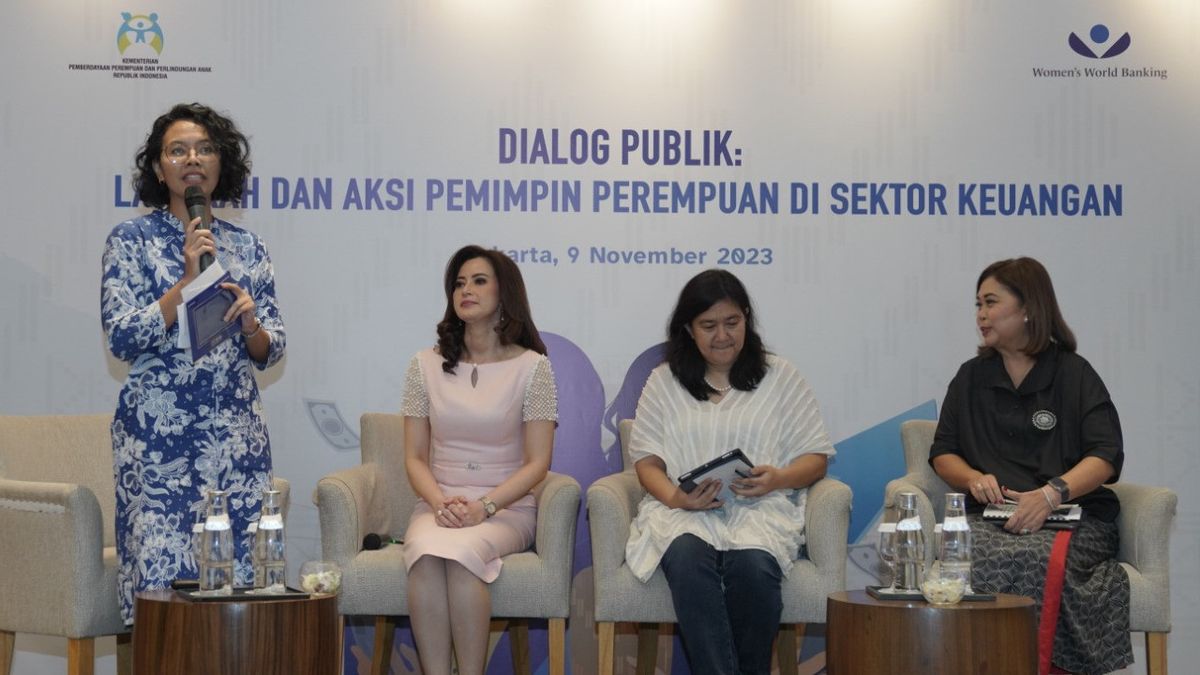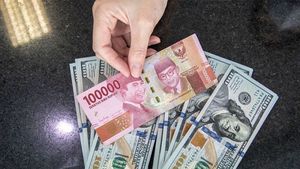JAKARTA - The Ministry of Women's Empowerment and Child Protection together with nonprofit organization Women ’s World Banking held a Public Dialogue entitled 'Steps and Actions of Women's Leaders in the Financial Sector', Thursday 9 November.
This activity aims to encourage concrete actions and practices in encouraging women's leadership in the banking and fintech sectors in Indonesia. This activity was opened by the Deputy for Gender Equality of the Ministry of Women's Empowerment and Child Protection, Lenny N. Rosalin. In addition, the keynote speakers present were the Head of the Inclusive MSME and Finance Development Group, Bank Indonesia Elsya MS Chani and the Special Staff of the Minister of Finance for Fiscal Policy for the Sectoral Development of Anas Points, Ph.D.
Meanwhile, the panel discussion session was moderated by the Deputy Director for Advocacy for Southeast Asian Policy Women ’s World Banking, and presented Bank Mandiri Deputy President Director Alexandra Askandar, Indonesian DANA Commissioner Chrisma Albandjar, and Founding Partner of SSEK Law Firm Ira Eddymurthy.
Lenny Rosalin said that of the 543 directors' seats in all banks operating in Indonesia, only 19 percent were filled by women. The challenges faced by women to tread the leadership line are varied, both because of the double burden experienced by women working and institutional challenges in institutions where women work.
"To achieve gender inequality as the Sustainable Development Goal target in 2030, efforts to increase the quantity and quality of female leaders need to be carried out. The financial, banking and financial sectors are strategic entry points to achieve this, including encouraging economic growth," he said.
Meanwhile, the Special Staff of the Minister of Finance for Fiscal Policy Formulation of the Anas Point Sectoral, Ph.D. said that efforts were needed both in terms of policy and industrial practice to support working women.
"Currently, the government is discussing the Draft Law on Maternal and Child Welfare. This bill has an important impact on how women get access and support before and after the birth process. For example, access to easy and affordable child care will help women return to the labor market," said Titik.
Based on the records of the Ministry of Women's Empowerment and Child Protection and the Ministry of Finance, the participation rate of the female workforce has stagnated below the participation level of the male labor force. Compared to ASEAN countries, Indonesia is ranked low below Singapore, Thailand, Cambodia, Laos, and Vietnam.
Research conducted by Women ’s World Banking found that women's participation in leadership roles in the banking sector was relatively low compared to men. This was concluded based on the results of interviews with 17 leaders in the financial industry, in-depth interviews with 32 male and female workers in the banking and fintech sectors, as well as a study of the company's bibliography and annual documents.
"Our research found that although female workers participated a lot in the banking sector. However, the percentage was getting smaller with the higher position. At the junior level, the percentage was still high at 50.7 percent, bigger than men. But the upwards, the lower, in the middle position at 42 percent, and at the senior level at 32.8 percent," said Research Lead Southeast Asia Women ’s World Banking Agnes Salyanty.
Exposure from the Managing Director of the Indonesian Fintech Association, Aries Setiadi, also found a gap in the proportion of women and men from the results of the 2023 Member Annual Survey.
"Encouraging women's leadership is important because with the participation of women, fintech companies can also spur performance, profitability and innovation," he said.
Legal and institutional framework support In the discussion session, legal practitioner Ira Eddymurthy as the founding partner of SSEK Law Firm said that Indonesia already has a complete legal basis that guarantees equal access and job opportunities for women. The Indonesian constitution also ensures that there is no discrimination based on gender.
"Now how to ensure human resource practitioners in banking and fintech can understand this legal basis and ensure women can work and get support," he said. Bank Mandiri Deputy President Director Alexandra Askandar said that institutional support would encourage the leadership and development of women's careers.
"Institutionally, we build a comfortable and safe work environment, as well as provide mentorship for women. This is a shared task and not only one institution," he said. Efforts to encourage women's leadership cannot be carried out reactively. Indonesian DANA Commissioner Chrisma Albandjar said that practices and policies needed to be designed from the start to ensure that the action taken had a real and positive impact on women.
"Women and men are different and have different needs. The workplace must by design the right steps to ensure the participation and leadership of women. For example, in DANA, 35 percent of the 900 workers are women, while out of 600 programmers only 10 percent of women. Realizing this, companies do need to consciously make strategies to encourage women to fill the roles that have been identified as male sectors," he said.
This public discussion was attended by 75 participants from various parties, including ministries, 22 of the largest financial service providers in Indonesia and associations related to the financial industry. The research of Women ’s World Banking “ Accelerates Women's Progress in the Role of Decision Making in the Banking Sector and Fintech Indonesia ” can be downloaded at https://www.wmensworldbanking.org/insights/report-catalyzing-womans-advancement-into-decision-making-roles-in-indonesiasias-banking-and-fintech-sectors/.
The English, Chinese, Japanese, Arabic, and French versions are automatically generated by the AI. So there may still be inaccuracies in translating, please always see Indonesian as our main language. (system supported by DigitalSiber.id)













